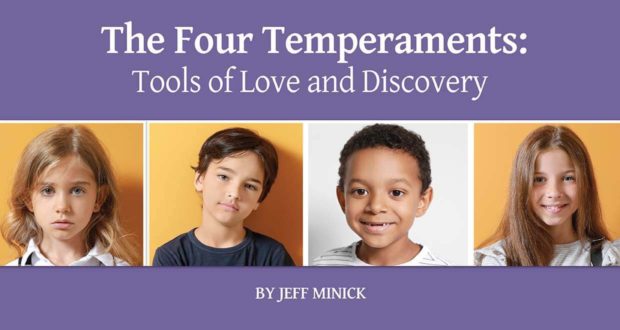Summary
Jeff Minick concludes his series on how knowing our and our children’s temperaments can profoundly assist us in their education and character development.For the last five issues of the Seton Magazine,we have looked at the four temperaments—choleric, melancholic, sanguine, and phlegmatic.
We’ve also looked at how recognition of these temperaments in ourselves and in our children can assist us in the education and character development of our young people. Links to the earlier articles are below.
How, for example, can the melancholic mom best guide her choleric son? How can the sanguine dad best encourage his phlegmatic daughter?
During these explorations we have relied heavily on The Temperament God Gave Your Kids: Motivate, Discipline, and Love Your Children. The authors of this book, husband and wife team Art and Laraine Bennett, raised four children—“one each of the four temperament types!”— and have written two other books on this subject: The Temperament God Gave You and The Temperament God Gave Your Spouse.
For Seton families, the Bennetts have proven ideal guides for this study of the four temperaments. Married for over forty years, devoutly Catholic, and familiar with homeschooling, they possess the expertise, the map and compass, to help us deepen our understanding of this ancient way of thinking about personality development. In prose affable in tone and reader-friendly, they explain that by identifying our children’s temperaments, we may then better educate them, help them grow in virtue, and come closer to Christ and His Church.
Rather than once again review these temperaments, let’s play along with the Bennetts, who use quotations from characters in A.A. Milne’s Winnie-the-Pooh to introduce each chapter on a specific temperament.
The Temperaments from a Pooh Perspective
Your Conquering Choleric Child kicks off with Rabbit: It was going to be one of Rabbit’s busy days. As soon as he woke up he felt important, as if everything depended on him. It was just the day for Organizing Something…a Captainish sort of day, when everybody said, “Yes, Rabbit,” and “No, Rabbit,” and waited until he had told them.
In Your Moody Melancholic Moppet, the donkey Eeyore is a natural choice: “I might have known,” said Eeyore. “After all, one can’t complain. I have my friends. Somebody spoke to me only yesterday. And was it last week or the week before that Rabbit bumped into me and said ‘Bother!’ The Social Round. Always something going on.”
Of all the creatures in the Hundred Acre Wood, Your Spirited Sanguine Sprout may best resemble Tigger: “Tiggers never go on being Sad,” explained Rabbit. “They get over it with Astonishing Rapidity.”
As for Your Peaceful Phlegmatic Progeny, Winnie-the-Pooh may fit that description: “It is more fun to talk with someone who doesn’t use long, difficult words but rather short, easy words like, ‘What about lunch?’”
When we investigate the temperaments, read about them, and take the tests offered by the Bennetts, which may be found online at their Temperament Quiz website, we need to bear in mind that often our personalities are a blend of these personality traits.
My own scores, for example, mark me as melancholic with a strong strain of choleric. On one amusing online test I took, which demonstrated what professions might have suited me in the Middle Ages, I came out as a theologian, a priest, an artist, or a writer. That last one made me smile. You’ll find “Your Medieval Personality Type” and more information on the four temperaments at Fisheaters.com.
Leading Our Children to Holiness
Near the end of their book, the Bennetts write “We discussed that parents have two roles: to establish a relationship with their children and to lead their children so that they might become the persons Christ wants them to be. Most of us (by temperament) lean one way or the other: toward relating or toward leading. But our children need us to be both: good at relating to them and good at leading them. This is not easy, but it is necessary for their growth, and for our own growth as parents. This is taking up our own cross daily, and it is a part of how our children help us to become holy.”
They then cite this passage from Pope Benedict XVI’s encyclical Spe Salvi:
“Life is like a voyage on the sea of history, often dark and stormy, a voyage in which we watch for the stars that indicate the route. The true stars of our life are the people who have lived good lives.”
Is this not what all parents long to be, the true stars of their children’s lives, examples of a life well lived?
Understanding the temperaments provides a richer understanding of our children and how we may best guide them to adulthood. As the Bennetts tell us, “Ultimately, our home can become, as Pope St. John Paul II said, a ‘community of life and love,’ the Domestic Church, the place where each person (no matter how small) is respected and valued, where his or her gifts flourish, and where love is discovered and shared.”
Earlier in Jeff Minick’s Temperament Series
In Where Did This Kid Come From? Homeschooling by the Temperaments, Jeff introduces us to the studies of Laraine and Art Bennett, experts on the temperaments and a tour of the four temperaments: choleric, melancholic, sanguine, and phlegmatic and how they influence family interactions and homeschooling.
What’s a Sanguine Mom to Do with Her Melancholic Daughter? introduces real life examples to help understand your children’s temperaments, sanguine, phlegmatic, choleric, and melancholic, and make sense of how we relate and grow closer as family. Includes comments from Seton Mom with a sanguine personality.
Keep The Flame Burning: Your Conquering Choleric Child, offers the advice that wise homeschool parents involve their choleric students in planning their school year as these kids do best when they have some control over their learning. Includes insight from a Seton Mom who is a phlegmatic/melancholic and teaches children who are choleric/sanguine.
Time to Party! – Homeschooling Your Fun-Loving Sanguine Child explains that to fully treasure your sanguine child’s friendliness, enthusiasm, and love of fun you need to help him stay on task with structure and clear expectations. Includes insight from a Seton Mom with a choleric temperament and her ongoing process to find balance between being organized, driven, and goal-oriented, and being flexible and letting a few things go.
Finally, Easy-Going, Patient, Serene, and Calm: The Phlegmatic Child proposes that you will give the world a calm, collected, and wise human being if you treasure your easy-going phlegmatic child, encourage them and guide them to engage life. Adding to the article’s usefulness is insight from a melancholic Seton Mom and how her patient persistence and ability to plan and organize has been major benefits to her family’s homeschooling journey.
Two Notes: The Temperament God Gave Your Kids appeared in 2012, two years before Blessed John Paul II became Saint John Paul II. In addition, the Bennetts refer several times in their book to Father Conrad Hock and his studies of the temperaments. Readers wishing to read more about that work can Google “Father Conrad Hock The Four Temperaments.”

 Seton Magazine Catholic Homeschool Articles, Advice & Resources
Seton Magazine Catholic Homeschool Articles, Advice & Resources

